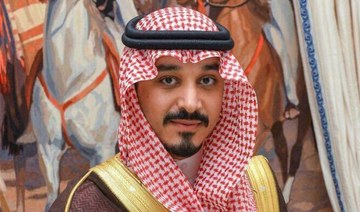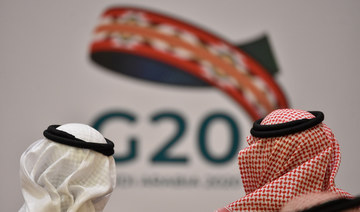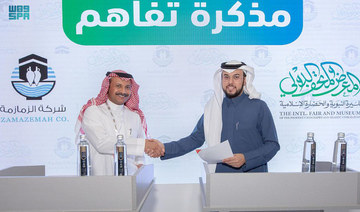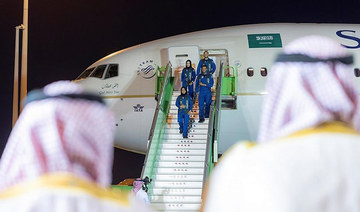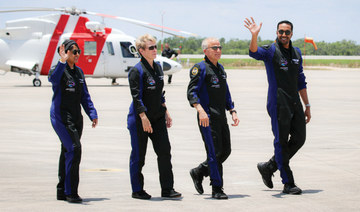JEDDAH: Improving access to the internet is a key step to achieving global connectivity and embracing a digital, technology-driven economy, G20 digital economy ministers said on Wednesday. It can also help global markets recover from the effects of the COVID-19 pandemic, they added.
During a meeting held under Saudi Arabia’s presidency of the G20, they discussed ways in which digital technologies can mitigate the effects of the coronavirus crisis, and help businesses become more resilient against the effects of future crises.
The ministers highlighted the importance of the digital economy in efforts to achieve the UN’s 2030 Sustainable Development Goals, and discussed human-centered and trustworthy artificial intelligence, smart cities, data flows, security in the digital economy, measurement of the digital economy, and global connectivity. They also considered ways to effectively invest in emerging opportunities to improve living standards and encourage more inclusive societies.
“Digitalization has been at the heart of every transformational journey for creating wealth, prosperity, and competitiveness,” said Abdullah Al-Swaha, the Saudi minister of communications and information technology.
“This year, we have agreed that in a post-COVID-19 world, (digital technology) has become the lifeline for our kids to continue their education, the lifeline for our loved ones outside of the ICU room, and the gateway to opportunities for youth and women.”
This year, he said, the G20 Digital Economy Task Force (DETF) brought together representatives of all G20 members as well as a number of guest countries. Next year, this group will be upgraded to the status of working group, which will elevate global discussions of the digital economy to a new level, he added.
“This is a historic milestone for the G20 presidency here in the Kingdom of Saudi Arabia,” Al-Swaha said. “I would like to thank the G20 member states for helping us declare a historic G20 declaration when it comes to the digital economy.”
Current estimates suggest that between $6 trillion and $9 trillion are at stake, more than 400 million jobs have been lost and 700 million people have slipped below the poverty line as a result of the pandemic. The G20’s digital leaders believe the onus is on them to help get the world back on track through digital transformation.
“We have just faced one of the biggest health and economic crises that the world has witnessed in 90 years. We definitely cannot afford a digital crisis,” said Al-Swaha.
To achieve the goals for the digital economy, Al-Swaha said policymakers need to take action to bridge the digital divide. Tremendous progress has already been made toward achieving this, through an agreed framework, he added.
“I want to acknowledge the leadership of my peers among the G20 (as they) come together and help the world (make the most of) the 21st century’s opportunities by empowering people, and focusing on youth and women, and by safeguarding the planet through shifting from a linear economy to the circular economy,” he said.
The minister pointed out that digitalization is as essential to the work of the G20 as it is to the success of Saudi Arabia’s Vision 2030.
“We are working closely with both the Organization for Economic Co-operation and Development and the (UN’s) International Telecommunication Union, as knowledge partners, to take G20 declarations based on connecting humanity even further, to other platforms, and making sure that the Kingdom is a leader by example,” said Al-Swaha.
In the past three years, a project to extend the fiber-optic network in Saudi Arabia has reached 3.5 million homes, ranking the country fourth globally in terms of 5G connectivity. About 99 percent of the Kingdom has basic connectivity, 96 percent has access to 4G, and the nation is one of the fastest-growing in the world for 5G deployment, with 45 percent coverage in more than 30 cities.
“This has helped us fight COVID-19,” said Al-Swaha. “It is not acceptable in 2020 that half of the world is not connected, because this means half of the world doesn’t have access to basic health care, education and, in some cases, clean water, sewerage infrastructure and energy.”
G20 ministers highlight importance of technology-driven economy
https://arab.news/9ae5m
G20 ministers highlight importance of technology-driven economy

Japan, Saudi Arabia leaders exchange views in video summit meeting

- The crown prince expressed his desire to visit Japan as soon as possible to further strengthen ties with Japan
- Kishida expressed his wishes for King Salman’s early recovery
TOKYO: Japanese Prime Minister Kishida Fumio held a productive video meeting with Crown Prince Mohammed bin Salman, the prime minister of Saudi Arabia, on Tuesday.
Kishida offered his best wishes for King Salman’s health, a gesture that was appreciated by the crown prince.
The crown prince expressed his desire to visit Japan as soon as possible to further strengthen ties with Japan. Kishida expressed his wishes for King Salman’s early recovery and said that he was also looking forward to strengthening the strategic partnership between Japan and Saudi Arabia, according to the foreign ministry in Tokyo.
As the two countries approach the 70th anniversary of their diplomatic relations, the Japanese foreign minister expressed his desire to work even more closely with Saudi Arabia. He emphasized the shared goal of realizing peace and stability in the Middle East, a sentiment that was echoed by the crown prince. The leaders agreed to establish a “strategic partnership council” chaired by them to further strengthen bilateral relations.
Kishida expressed gratitude for Saudi Arabia’s stable supply of crude oil to Japan over the years. He also expressed his anticipation for Saudi Arabia to continue playing a leading role in stabilizing the global oil market, including through production increases, a sentiment that was appreciated by the crown prince.
Kishida added that he would like to cooperate in establishing a global supply chain for clean energy, such as hydrogen and ammonia, and promote cooperation in the field of mineral resources while using Japanese technology under the “lighthouse initiative” agreed between the two countries in July last year.
The crown prince said that Saudi Arabia would like to cooperate with Japan in various areas, including clean energy, and the Kingdom remained committed to providing a stable supply of crude oil to Japan.
Kishida expressed interest in creating business opportunities in Saudi Arabia, and making direct investments in Japan in a wide range of fields, including construction, power transmission, hydrogen, digital fields, information and communications technology, space, health, medicine, food and agriculture.
He also said that he would like to work together to achieve an early realization of the Japan-GCC free trade agreement. This agreement, once implemented, will significantly boost trade and investment between Japan and the GCC countries, creating new business opportunities and fostering economic growth. Negotiations are scheduled to resume soon.
The crown prince said that he welcomed the resumption of negotiations for the Japan-GCC free trade agreement and cooperation with Japan in fields beyond energy.
On peace and security, Kishida explained Japan’s diplomatic efforts and contributions in Gaza, including humanitarian aid and diplomatic initiatives. The crown prince said that he envisioned continued cooperation with Japan on diplomatic efforts to realize peace and stability, appreciating Japan’s active role in the region.
Kishida said that he would be pleased to hand over the symbolic “torch” of the expo to Saudi Arabia following Expo 2025 in Osaka-Kansai. This act symbolizes the continuation of the spirit of international cooperation and cultural exchange. He added that he would like to encourage cultural exchanges in entertainment, tourism, academia and football.
The crown prince said that Japan was an outstanding country in terms of culture and that he sought to strengthen cooperation with Japan in this area.
Read More: Saudi, Japan discuss ties at Vision 2030 business forum in Tokyo
300 tons of Zamzam supplied daily in Madinah

- To ensure that Zamzam water is safe, a specialized technical staff takes more than 80 samples daily and examines them with the latest equipment
RIYADH: The General Authority for the Affairs of the Grand Mosque and the Prophet’s Mosque exerts all efforts to provide Zamzam water at the Prophet’s Mosque so that worshippers and visitors can enjoy the blessed water.
The authority supplies 300 tons of Zamzam water, brought daily from Makkah to the mosque in Madinah on bowsers equipped for this purpose, the Saudi Press Agency reported.
To ensure that Zamzam water is safe, a specialized technical staff takes more than 80 samples daily and examines them with the latest equipment.
Meanwhile, Zamazemah Co. and the Coordination Council for Institutions and Companies Serving Domestic Pilgrims (Mutahed) signed a memorandum to provide Zamzam water bottles to domestic pilgrims during Hajj.
Deputy Minister of Hajj and Umrah Dr. Abdulfattah Mashat attended the signing. This agreement aims to ensure high-quality services for pilgrims.
Saudi Arabia a ‘faithful friend’ of Cameroon, says envoy

- Cameroon’s ambassador to Saudi Arabia said that cooperation between his country and the Kingdom has “continued to deepen over the decades”
RIYADH: Cameroon has celebrated its national day at a diplomatic event in Riyadh, with the country’s ambassador hailing Saudi Arabia as a “faithful friend.”
Iya Tidjani, speaking at a reception on Monday in the Saudi capital to mark Cameroon’s 52nd national day, said that cooperation between his country and the Kingdom has “continued to deepen over the decades.”
Riyadh Mayor Prince Faisal bin Abdulaziz bin Ayyaf was the guest at the reception, which was attended by diplomats in Riyadh, Saudi officials and businessmen, the Cameroonian community and embassy staff.
“Since 1966, the year of establishment of relations between the two countries, these ties have continued to deepen and diversify to the mutual benefit of both countries,” Tidjani said.
The ambassador praised Saudi Arabia for sending medical missions every year to support the Cameroonian health sector.
“Our government also expresses sincere thanks to Saudi Arabia for their laudable efforts for the Hajj, both in terms of organization and infrastructure,” he added.
In 2019, the Great Mosque of Maroua in northern Cameroon was inaugurated, built with the support of Saudi Arabia.
The mosque can accommodate up to 5,000 worshipers and is “considered one of the most beautiful achievements in mosque construction in sub-Saharan Africa,” said Tidjani.
The ambassador highlighted Cameroon’s battle against the Boko Haram militant organization, describing Saudi Arabia as a “friend and a major player … as can be seen from its role in the fight against terrorism.”
He added: “Cameroon and Saudi Arabia share similar views on international issues and Cameroon joins the international community to support Saudi Arabia in its effort toward peace in the Middle East and beyond.”
Cameroon’s national day on May 20 saw citizens celebrate the “unity, peace and stability of a country firmly committed to the path of emergence,” the embassy said in a statement.
Saudi center maps 246 areas to fight desertification

RIYADH: The National Center for Vegetation Development and Combating Desertification has completed a significant step in its fight against desertification: the first phase of a project to assess the state of land degradation across the Kingdom, resulting in the creation of 246 detailed maps.
These maps provide valuable insight into desertification trends and the current state of land degradation in different regions, the Saudi Press Agency reported on Tuesday.
The center’s teams conducted extensive studies to better understand the processes of desertification and land degradation and to identify effective strategies to combat them.

The project combined cutting-edge technologies and traditional methods to gather data, including geographic information systems, remote sensing techniques, and field surveys.
Fieldwork included collecting soil samples for analysis, studying plant life at designated sites, and analyzing satellite imagery.
The center has launched the second phase of the project, starting in the Riyadh region. During this phase, it will focus on identifying areas most vulnerable to desertification, classifying the causes and types of land degradation, and conducting further field surveys to gather more detailed data.
Arab innovators shine in space exploration contest

- Saudi Space Agency awards 10 winners in arts, botany, engineering
RIYADH: The Saudi Space Agency wrapped up its Space Madak competition on Tuesday by awarding 10 winning contestants prizes for their arts, botany and engineering projects.
Hailing from seven Arab countries, the winners were revealed at a ceremony hosted by the agency at the Communications, Space and Technology Commission headquarters in Riyadh.
The event marked the first anniversary of Saudi Arabia’s “Journey to Space” mission and was attended by the agency’s CEO Mohammed Al-Tamimi, officials, experts, and ambassadors from the winning students’ countries.
The competition, engaging ambitious Arab students, showcased their enthusiasm for space exploration and skills development.
The panel of judges comprised scientists, experts and space enthusiasts.
Following rigorous evaluation rounds, the top 10 contenders were chosen for their exceptional contributions.
In the arts category, winners included Yamen Al-Zaabi from Jordan, Preeti Sami from Egypt, Jawaher Farhan from Bahrain, Rafqa Mansour from Lebanon, and Aline Al-Issa from Saudi Arabia.
Sadan Al-Dosari from Saudi Arabia, Hooriya Basheikh from Morocco, and Fatima Al-Khabouriah from Oman won in the botany category.
Engineering-category winners were Abdulrahman Qattan from Saudi Arabia and Yara Reda from Syria.
The ceremony celebrated the winners and acknowledged the creative endeavors of more than 50 finalists, chosen from a pool of 80,000 submissions vying for prizes totaling SR500,000 ($133,320).
The winning projects will be showcased on the International Space Station, offering an opportunity to advance research, development, and innovation in space exploration while enriching Arab contributions in this field.
The competition represents a significant milestone in the Saudi Space Agency’s mission to support research, development, and innovation within the domain of space exploration.
With a focus on nurturing creative thinking among Arab students, the initiative aims to ignite curiosity about space and inspire breakthroughs in this burgeoning field.
The space mission, carried out by astronauts Rayyanah Barnawi and Ali Al-Qarni, included 14 pioneering scientific experiments.
According to a press release issued by the agency, the mission was a part of the “Saudi Toward Space” program, aligning with the Kingdom’s focus on research, development and innovation driven by Crown Prince Mohammed bin Salman.
Al-Tamimi praised the achievements of the SSA-HSF1, or Saudi Space Agency-Human Space Flight 1, mission. This was a major milestone in the Kingdom’s journey toward leadership in the space sector.
He said there were 14 research experiments conducted in microgravity, yielding valuable contributions to research, development and innovation.
Al-Tamimi said the mission helped foster national expertise and enhance cooperation with leading international institutions.
He added that the agency remained committed to supporting innovative projects.



